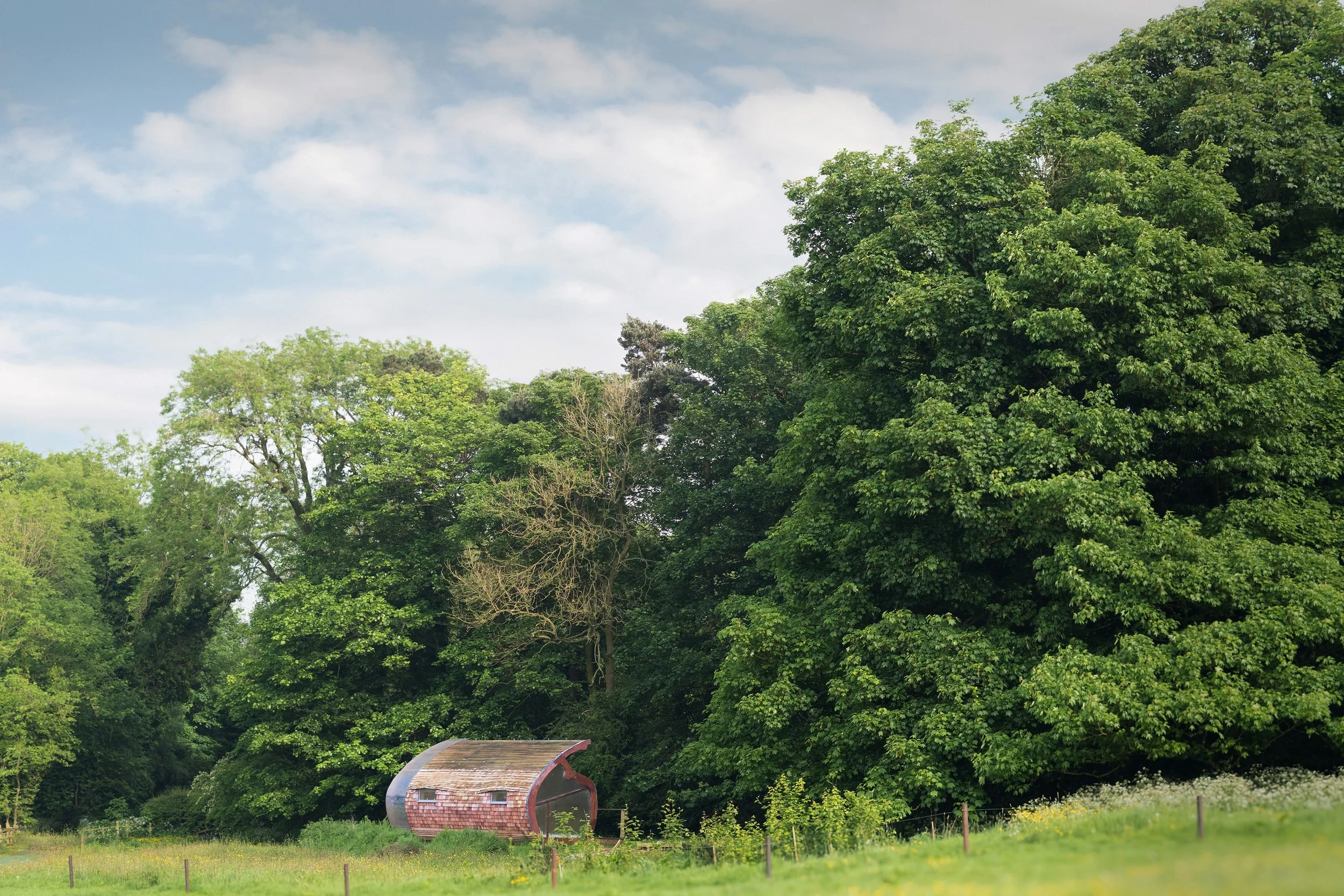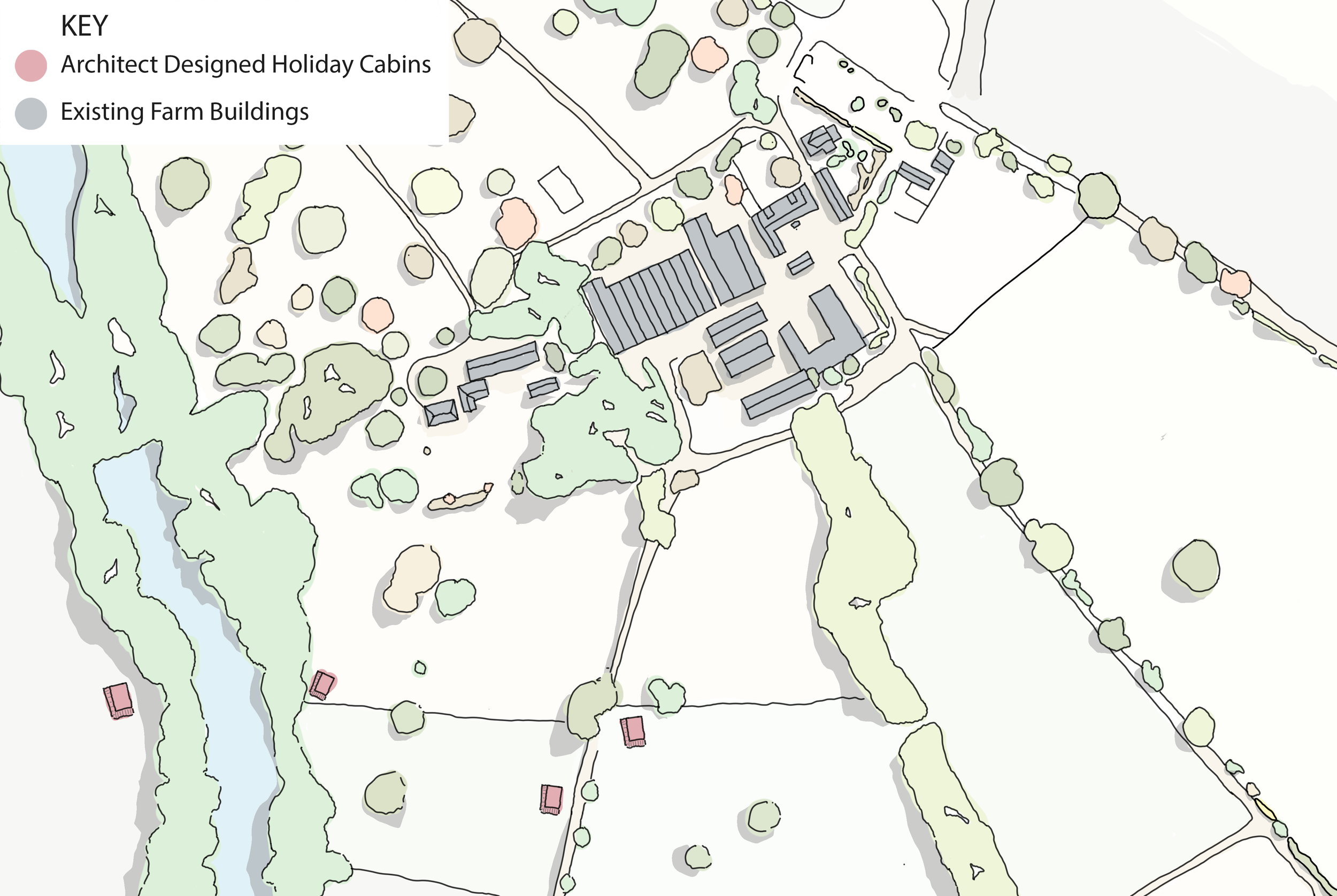Earn from Your Land: How Rural Plots Can Generate Income
We design carefully considered eco homes and luxury holiday homes that perform well, age gracefully, and make long-term financial sense. RIBA Chartered Architects.
Why diversify income from your land?
Owning a country home or small farm is wonderful, but this typically comes with high overhead. Instead of viewing your estate solely as a private residence, consider how it might generate income. Many rural homeowners are now exploring small-scale ventures to generate extra income from their land. In fact, about 65% of UK farmers have diversified their income streams in some way, highlighting how common it’s become to seek additional revenue beyond traditional farming or residency. One of the most popular and rewarding diversification ideas is to create a holiday let business on your property.
Glamping has surged in popularity as travellers seek unique, nature-immersive getaways. According to Grand View Research, the UK glamping market is growing quickly; it generated roughly £320 million in revenue in 2024 and is projected to reach £530 million by 2030, so demand for well-designed rural retreats is on the rise. For a landowner, this trend represents a chance to generate income in a sustainable, enjoyable way.
In this article, we will explore how to ensure a holiday let business complements your land and existing business uses, rather than spoiling them. We will also explore important considerations when adding a holiday cabin to your land.
An architect-designed eco cabin discreetly located within a Shropshire dairy farm, developed as part of a rural diversification strategy. Careful siting and landscape integration allow the cabin to generate income without compromising the character or operation of the farm.
Who should not explore a holiday cabin?
Holiday cabins are not suitable for everyone. If you are hoping to enter the market with minimal capital, this is unlikely to be a good option. As a rule of thumb, a serious project requires a minimum investment of £50,000, excluding land value, and often more once infrastructure and compliance are factored in.
There is a common misconception that holiday-let cabins can be delivered “on the cheap.” That window largely closed after the COVID boom. Today, competition is strong, guest expectations are high, and poorly executed cabins struggle to perform. To get the best return from your finances, you must invest enough to create something robust, compliant, and genuinely desirable.
We regularly see low-cost, poorly regulated structures fail within a few seasons. Exposed to the UK’s wet, cold climate, they degrade quickly and rarely become assets that hold value. If the goal is to build a long-term income stream rather than a short-lived experiment, cutting corners at the outset is usually the most expensive decision you can make.
Low-Impact Cabins That Don’t Change the Character of Your Land
Unlike large, permanent developments such as barn conversions or new houses, a small number of well-sited holiday cabins can be placed discreetly within the landscape. They don’t dominate the land or change how it feels to live there.
A carefully designed timber cabin, positioned at the edge of a field or within existing woodland, can be barely visible from the main house or neighbouring properties. Features such as natural materials, low rooflines, and green or planted roofs allow the building to settle into its surroundings rather than stand out against them. Important for sensitive rural settings, such as the green belt, conservation areas or AONB.
From a construction point of view, cabins can often be built using minimally invasive foundations, such as screw piles instead of concrete slabs, reducing long-term impact on the land. The result is a holiday let that feels secluded and special for guests, while allowing you to retain privacy, views, and the overall character of your property. In many cases, the cabins can be designed so that visitors won’t even notice the cabins are there unless they’re shown.
Early site diagram showing how holiday cabins can be positioned within a working farm without disrupting access, operations, or landscape character. This type of analysis is used to assess whether a site is suitable at all, before design development begins.
Strong Rental Returns Without a Complex Operation
A well-designed holiday cabin can significantly outperform traditional residential rentals. As a practical example, my own Monocoque Cabin in Shropshire achieves around £155 per night, which is almost three times what my mum achieves on her flat in Cyprus, despite her flat costing nearly double what it did for me to build the cabin.
The difference was not size, location, or marketing spend. It was design intent and differentiation. The Monocqoue Cabin was conceived from the outset as a place guests would actively choose because it felt special, considered, and memorable, not something they would tolerate simply because it was affordable.
That distinction matters. Guests are willing to pay a premium for accommodation that offers a clear experience, privacy, and a sense of quality. When the design is right, strong nightly rates can be achieved with relatively low operational overhead. A single, self-contained cabin typically requires little more than cleaning and linen changes between stays, yet can deliver returns that would be difficult to achieve through conventional buy-to-let property.
Flexible Exit Options
A well-planned holiday cabin development gives you options beyond simply operating it indefinitely. If your circumstances change, you are not locked into a single use of the land. Subject to planning and legal considerations, the holiday-let business can often be sold separately from your main home, either as a going concern, with the land leased to a buyer, or by subdividing a small parcel of land containing the cabins.
Because cabins are relatively small and, in some cases, relocatable, they are easier to transfer to a new operator than permanent buildings. Crucially, the value lies not in the cabins themselves, but in a fully systemised business, through an asset that is differentiated and beautful one with proven income, planning clarity, and low maintenance. Short-lifespan structures do not form part of a saleable business.
Alternatively, you may choose to retain ownership of the land and lease the operation to a hospitality operator for a more passive income, or repurpose the cabins for personal use if you step away from letting. Compared to permanent conversions, this approach offers far greater flexibility: you can scale the business, hand it over, or return the land to private use with minimal disruption.
Personal Fulfilment and Lifestyle Alignment
Running a holiday cabin can be rewarding in ways traditional property investments rarely are. For context, I own and operate a holiday let business and have previously owned conventional buy-to-let properties. The difference in day-to-day experience is significant.
Holiday-let guests actively choose to be there. They arrive looking forward to their stay and often leave genuinely delighted. That shift changes the nature of the relationship entirely. Regularly, we receive messages from guests explaining why they booked the cabin; to mark a tenth anniversary, a birthday, or time away together.
For many landowners, this is an overlooked benefit. A well-designed holiday cabin can fit around your life rather than compete with it: sharing your land on your own terms, at a scale you control, while creating an experience people genuinely value. The financial return matters, but so does the satisfaction of building something that leaves a lasting impression.
Speak to Peter the Architect
Book Your Free 20-Minute Eco-Home Strategy Call
If you’re considering eco-cabins, luxury log cabins or a small holiday-let business on your land, a short call can save you time, money and uncertainty. Before you commit to anything, we can look at:
Whether your land is genuinely suitable for a unique log cabin
Planning risks and opportunities specific to rural diversification
Likely development and infrastructure costs
Realistic rental potential based on design and positioning
Next Steps: Where Holiday Cabin Projects Succeed or Fail
Developing a holiday cabin can be exciting, but success depends on making the right decisions early. In our experience, most projects that struggle don’t fail because of demand; they struggle because of avoidable mistakes and poor planning made at the outset. These are the four areas that deserve careful attention from day one.
Planning & Regulations
In the UK, using land for holiday accommodation beyond 28 days a year will usually require planning permission, and permanent, commercially used cabins almost always need consent. This is often where unrealistic projects are exposed. Sensitive siting, clear justification, and a credible design approach make a material difference to outcomes. Engaging an architect with experience in rural and countryside planning can help shape proposals, manage risk, and guide pre-application discussions before high costs are incurred. There is also potential for new regulations, C5 Planning Permission.
Investment & Infrastructure
The cabin itself is, in some instances, not the highest cost. Services such as power, water, drainage, access, and ground conditions can easily outweigh the building if not properly planned for. Off-grid solutions, including solar, battery storage, or alternative drainage, can be effective, but only when planned professionally. It is crucial to plan these things early; a good place to start is referencing the RIBA Plan of Works.
Marketing & Management
Even the best-designed cabin needs a clear route to market. Platforms such as Airbnb or Coolstays can provide initial visibility, but long-term performance depends on positioning, presentation, and the quality of the guest experience. The most successful operators start simply, systemise cleaning and check-in early, and refine the offer based on feedback rather than chasing volume. In our experience, strong word of mouth quickly becomes one of the most effective drivers of bookings.
Insurance & Safety
Holiday accommodation brings additional responsibilities. Appropriate insurance, including public liability and holiday let cover, is essential. Practical safety measures such as fire blankets, extinguishers, adequate lighting, and handrails should be considered early and integrated into the design rather than added as an afterthought.


